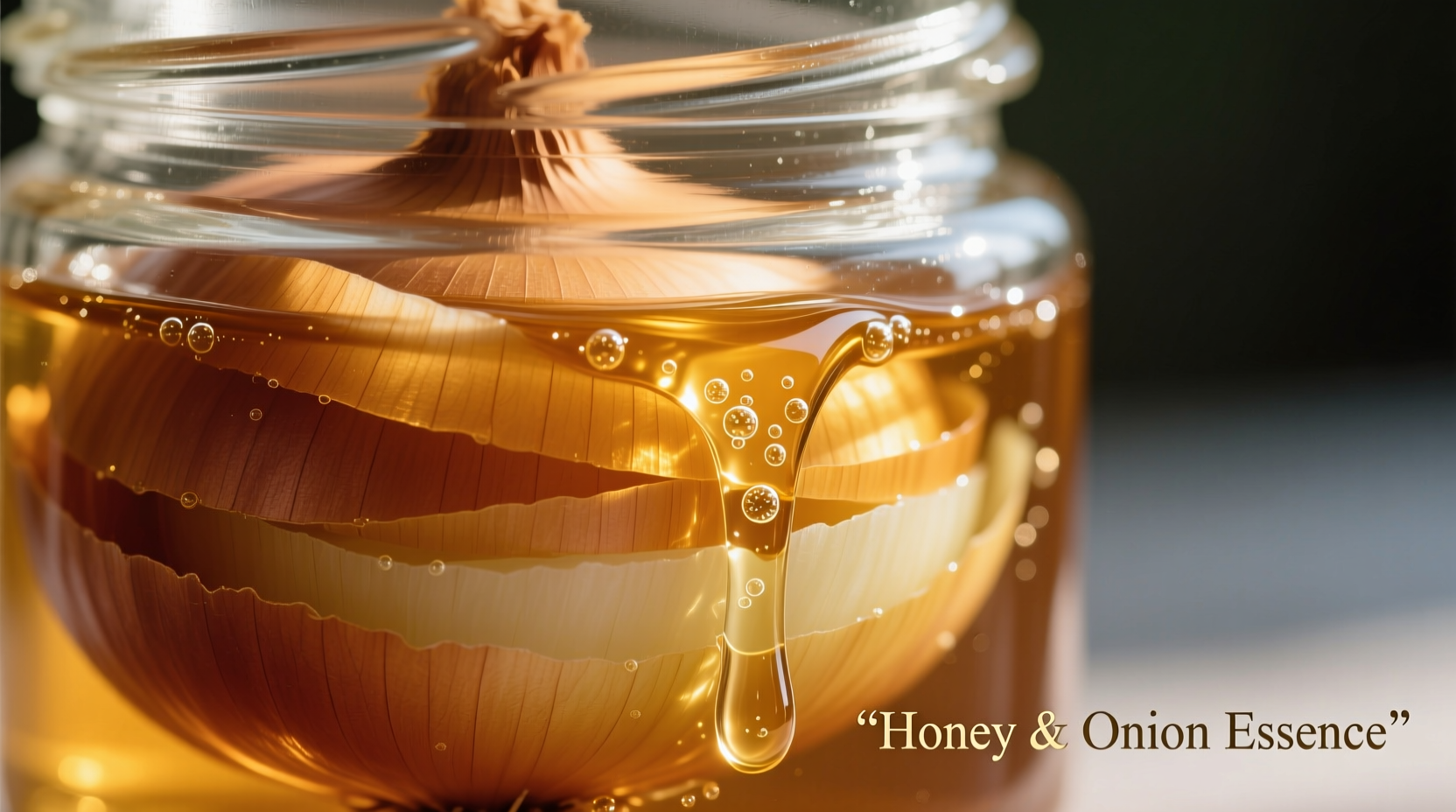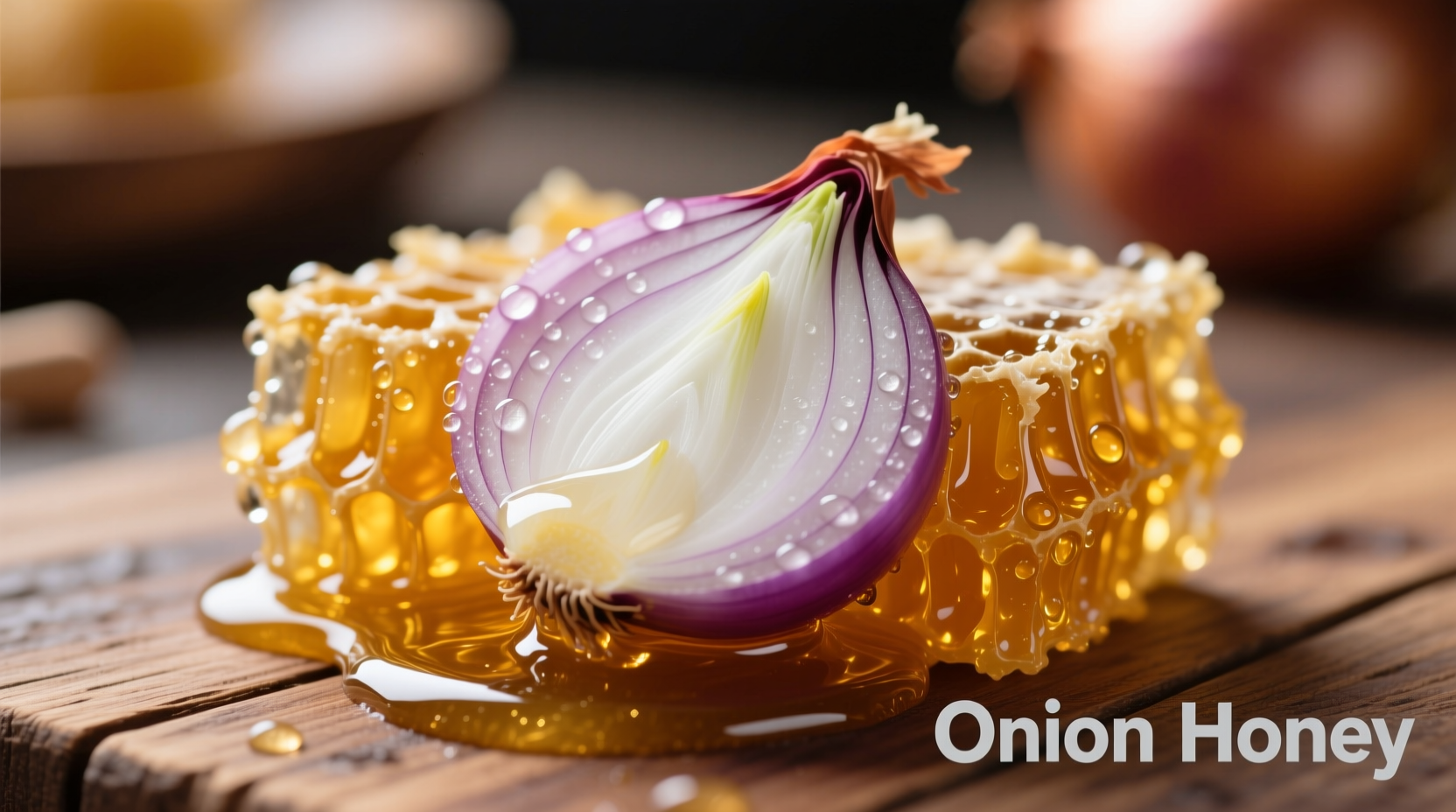Onion honey is a traditional home remedy made by layering sliced onions with raw honey, allowing the honey to extract beneficial compounds from the onions. This simple preparation creates a natural syrup used for centuries to soothe coughs, ease sore throats, and support respiratory health. Scientific evidence confirms both onions and honey possess antimicrobial and anti-inflammatory properties that may provide symptomatic relief for minor respiratory issues.
Why This Time-Tested Remedy Deserves Your Attention
When nighttime coughs keep you awake or that persistent throat tickle won't go away, reaching for chemical-laden cough syrups isn't your only option. Onion honey offers a gentle, kitchen-based solution with roots stretching back to medieval apothecaries and colonial home remedies. Unlike store-bought medications that often come with drowsiness or other side effects, this two-ingredient preparation works with your body's natural healing processes.
Recent research published in the Journal of Food Science and Technology confirms that raw honey maintains potent antimicrobial activity against common respiratory pathogens, while onions contain quercetin—a flavonoid with demonstrated anti-inflammatory effects. When combined through this simple extraction process, they create a synergistic remedy that's both effective and remarkably safe for most adults and children over one year old.
The Science Behind Onion Honey's Healing Power
Understanding why onion honey works requires examining both ingredients separately and together. Onions contain several bioactive compounds including:
- Quercetin—a powerful antioxidant that reduces inflammation
- Allicin—released when onions are cut, with antimicrobial properties
- Vitamin C—supports immune function
Raw honey contributes its own impressive profile:
- Hydrogen peroxide—naturally produced antimicrobial compound
- Phytochemicals—from the flowers bees visited
- Viscosity—soothes irritated throat tissues
| Component | Traditional Understanding | Scientific Validation |
|---|---|---|
| Onion compounds | "Draws out infection" | Quercetin reduces inflammation; allicin has antimicrobial properties |
| Honey's texture | "Coats and soothes" | Viscosity creates protective barrier on throat mucosa |
| Combined effect | "Strengthens the body's defenses" | Synergistic antimicrobial action against common respiratory pathogens |
How to Prepare Authentic Onion Honey (Step-by-Step)
Creating effective onion honey requires attention to detail. Follow these evidence-based preparation steps:
- Select quality ingredients: Use organic yellow onions (highest quercetin content) and raw, unfiltered honey
- Prepare the onions: Thinly slice (1/8 inch) to maximize surface area without crushing cells
- Layer properly: In a clean glass jar, alternate 1/2 inch onion slices with 1/4 inch honey layers
- Wait patiently: Cover with cheesecloth and let sit at room temperature for 4-6 hours
- Collect the remedy: Strain the liquid that forms (the "honey") into a clean container

The resulting amber-colored liquid contains concentrated beneficial compounds extracted from the onions. Properly stored in the refrigerator, it remains effective for up to two weeks. For maximum benefit, take one teaspoon every 2-3 hours as needed for symptom relief.
When Onion Honey Works Best (And When It Doesn't)
Understanding the appropriate context for using onion honey prevents misuse and sets realistic expectations. This remedy shines in specific situations but has clear limitations:
| Best Applications | Not Recommended For |
|---|---|
| Mild coughs from colds or allergies | Bacterial infections requiring antibiotics |
| Sore throats from viral infections | Children under 1 year (honey risk) |
| Nighttime cough suppression | Severe breathing difficulties |
| Early-stage respiratory symptoms | Chronic conditions like asthma |
The National Center for Complementary and Integrative Health emphasizes that while honey shows promise for cough relief, it should never replace professional medical care for serious conditions. Onion honey works best as a complementary approach during the early stages of minor respiratory discomfort.
Historical Journey of Onion Honey Through Time
Onion honey's therapeutic use spans centuries and continents, evolving through practical experience rather than laboratory development:
- 1500s: Featured in European herbals like Grete Herball as a "sovereign remedy for coughs and hoarseness"
- 1700s: Common household preparation in American colonial homes documented in family remedy books
- 1800s: Included in medical texts like The Family Physician as a standard cough treatment
- 1900s: Gradually displaced by commercial cough syrups but maintained in rural and traditional medicine practices
- 2000s: Renewed interest due to antibiotic resistance concerns and research on natural antimicrobials
This historical timeline demonstrates how practical effectiveness—not scientific validation—sustained onion honey's use through generations. Modern research now provides the scientific explanation for what traditional practitioners observed empirically.
Practical Tips for Maximum Effectiveness
While simple to prepare, these evidence-based adjustments enhance onion honey's effectiveness:
- Temperature matters: Never heat the final preparation above 104°F (40°C) to preserve honey's beneficial enzymes
- Timing is key: Take before bed for nighttime cough relief—honey's viscosity works best when lying down
- Quality counts: Darker honeys like buckwheat contain higher antioxidant levels than lighter varieties
- Storage wisdom: Glass containers preserve potency better than plastic (honey can absorb chemicals)
For children over two years old, the Centers for Disease Control acknowledges honey's effectiveness for nighttime coughs, making onion honey a sensible alternative to medicated syrups that often provide minimal benefit with potential side effects.
Important Safety Considerations You Should Know
Despite its natural ingredients, onion honey requires sensible precautions:
- Never give to infants under 12 months due to botulism risk from honey
- Diabetics should monitor blood sugar as both ingredients contain natural sugars
- Allergy awareness: Onions belong to the allium family—those with garlic or onion allergies should avoid
- Not a substitute for antibiotics when bacterial infection is present
The Mayo Clinic confirms that while honey shows promise for cough relief, it should complement—not replace—standard medical care for persistent symptoms. If your cough lasts more than 10 days, produces colored mucus, or accompanies fever, consult a healthcare provider.
When to Seek Professional Medical Care
Knowing the boundaries of home remedies prevents dangerous delays in treatment. Seek medical attention if you experience:
- Cough lasting longer than 10 days without improvement
- Fever above 101°F (38.3°C) lasting more than 48 hours
- Difficulty breathing or wheezing
- Chest pain or pressure
- Coughing up blood or rust-colored mucus
Onion honey serves as a valuable tool for minor, temporary discomforts but shouldn't mask symptoms of serious conditions. The American Lung Association emphasizes that persistent respiratory symptoms warrant professional evaluation to rule out conditions requiring specific treatment.











 浙公网安备
33010002000092号
浙公网安备
33010002000092号 浙B2-20120091-4
浙B2-20120091-4